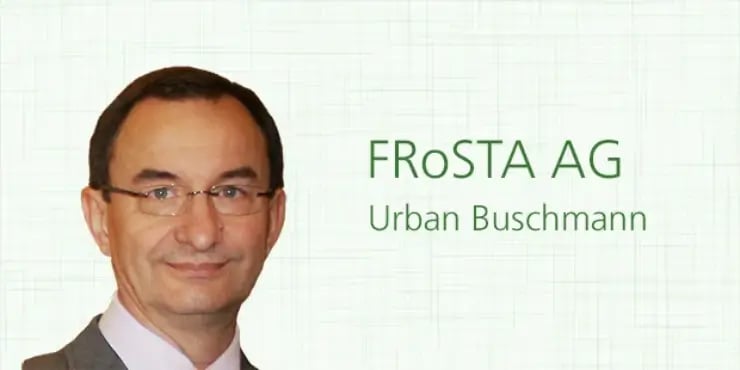Urban Buschmann is Head of Sustainability and Process Development at FRoSTA, one of the biggest producers of frozen products in Europe. In this recent interview, the food production engineer talks about the importance of CO2 balances for the company. Moreover, he gives insights into his projects for the calculation of carbon footprints for products (Product Carbon Footprint).
You were responsible for implementing a CO2 balance assessment for individual products and production sites. What does the Product Carbon Footprint (PCF) entail for FRoSTA?
In 2007 we started to work with PCF calculations as a basis to underpin the FRoSTA Reinheitsgebot (Purity Command). Back then there were very few consultants for this topic, and it was pure luck that we were able to take part in a PCF Pilot Project in Germany managed by Thema1 and supported by WWF, the Potsdam Institute for Climate Impact Research as well as the Institute for Applied Ecology (Öko-Institut).
Aside from gaining important knowledge and expertise of how to design environmental awareness advertising, we learned the basic principles for calculating the environmental impacts. All participants calculated their own product examples and discussed the intermediary results with each other. While most people commissioned scientific institutes to carry out their calculations, FRoSTA began to develop its own system using Excel. This was a very important step because it gave us a closer understanding of the environmental influences and their impacts. The different PCF calculations for products, processes and factories resulted in a eureka moment in the company, and the new environmental calculation system became strategically important.
Since 2011, FRoSTA has been calculating and publishing the PCF of all its products with some background documentation. For every investment, the board is demanding an ecological assessment of the project, so that each investment clearly results in environmental progress.
For two years, the PCF system has been integrated into the inventory control system, which enables rapid PCF calculations. This also enables an assessment of the Corporate Carbon Footprint based on the directly registered usage.
What are the biggest uncertainties for your calculations and how do you deal with them?
The raw materials we buy are the most uncertain factor because hardly any of the suppliers carries out PCF calculations as standard. Since FRoSTA began using the calculation system, we have been working together with suppliers to collect data from the producers (e.g. visitation of the purchase department or quality assurance). This system is still used in this form today. Meanwhile we have developed a profound data base for fishing throughout the world’s oceans, various forms of meat production, and the relationships in the soil for vegetable growing.
Another difficult step was modelling the holding time and the energy used by the retailer and the consumer.
What has been your experience when you ask suppliers about carbon footprints? Does FRoSTA require this information from its suppliers?
As mentioned above, the suppliers of the raw materials are not so aware of this. For this reason, FRoSTA does not ask them for final PCF results. FRoSTA is more interested in data so that we can integrate this into our own system. If we feel that a supplier is interested in learning about PCFs, FRoSTA provides systematic support and puts them in touch with well-known consultants. Over the years, PCF systems have been developed among packaging suppliers in particular.
Did any PCF projects produce surprising results? Can you briefly outline the example?
When we compared a frozen meal and a fresh product cooked from the same recipe, we were positively surprised. We found that storing supposedly fresh carrots or potatoes has a considerable impact. It was also possible to see the noticeable effect that packaging for household ingredients has on the PCF, for example 50 g of pepper.
It showed that the frozen meal had a lower carbon footprint than the freshly cooked product. The freshly-made version was only more advantageous, when it was made from ingredients bought from the producer around the relatively short harvest time.
Do you think that indicating the Carbon Footprint will become a matter of course for manufacturers in the future?
It should be the case that manufacturers know the PCFs for all their products and operations so that they can justify their behaviour environmentally. Considering the rapid population growth and to make progress in tackling climate change, we should know the emissions for all areas. This awareness should also help support politics for a positive, long-term development. As this is becoming more and more important, the PCF calculations could well be obligatory in the future.
What advice would you give to companies who are beginning to assess carbon footprints?
First of all, I would advise companies that want to start looking at PCFs to hire a good consultant who would also introduce a system. On the other hand, internal staff should be selected based on their personal commitment to the environment. The system environment should be organized in a way that it adapts to the data organisation, which is already used in similar areas.
Thank you Mr. Buschmann!
More information about FRoSTA can be found here.






